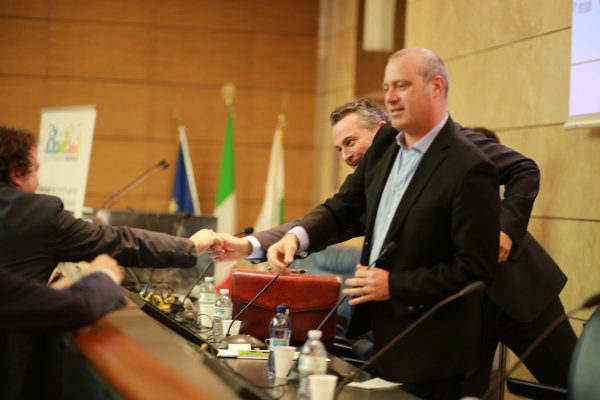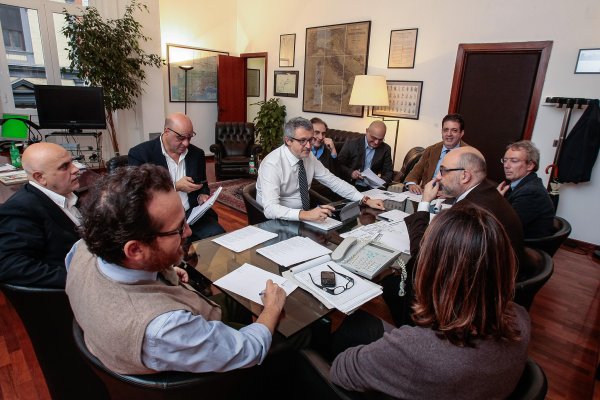Business Culture: Business Meetings
Italy is linguistically, religiously, and ethnically homogeneous, but culturally diverse. Even though almost the entire population is Italian, the official language is Italian, and Roman Catholicism is by far the prevailing religion, there are significant differences in the style and etiquette of the north and south.
The business environment centered in Milan is characterized by the more formal and direct customs of northern Europe, while the environment associated with the south is much more related to the informal and indirect customs of other Mediterranean countries. Your meetings and negotiations will follow different patterns depending on where in Italy you do business.
No matter which region, Italians have a very long history as experienced and successful businesspeople. Expect them to appreciate charm and to pay attention to the details of dress and how you comport yourself. As a liberal democracy with a well-educated population, Italy is a place where you can feel comfortable discussing a wide range of political and social issues with lively conversation.
Preparation
Because Italian business relationships tend to be more personal, it is important to initiate contact via a well-regarded third party. Your country’s embassy in Italy may have a commercial services division that specializes in helping businesspeople find a contact to help you with introductions.
Strive to make appointments at least a couple of weeks in advance. E-mail is available and widely accepted in Italy for business correspondence. You can use it to set up an appointment, but a personal contact for verification is necessary. English is widely accepted as a primary language for business, but outside of the major cities you may find the preference is Italian. You should inquire as to whether it will be necessary to have an Italian interpreter available.
Even the slightest attempt by a foreigner to speak Italian is appreciated.
| English | Italian |
|---|---|
| Hello | Ciao |
| How are you? | Come va? |
| Excuse me | Mi scusi |
| Goodbye | Ciao |
| Good morning | Buon giorno |
| Good evening | Buona sera |
| Thank you | Grazie |
Keep in mind that the Italians are media savvy and politically involved. Conversations, even simple get-acquainted ones, can be heated and interesting. Feel free to discuss those things you know about, but do your best to avoid controversy. It is always safe to talk about how beautiful Italy is and how artistically sophisticated the Italian people are.
Scheduling
Punctuality is important for you as a visitor but less so for your host. The big Italian cities all have major traffic problems, so your arrival may easily be delayed. Phoning in advance if you are delayed is a necessary courtesy. You will be judged negatively if you are not on time and either don’t phone or have a bad excuse.
Be prepared to be flexible when arranging meeting times, as it is very common for meetings to get cancelled and rescheduled even at the last minute. Even though the country is secular, Italians observe many Catholic holidays, during which many businesses will be closed. As in most of Europe, Italian businesspeople take their annual vacations in August, so it may be difficult to schedule business meetings at that time.
Food plays a central part in all Italian activities; you can expect either long working lunches or extravagant dinners devoted to socializing. It is extremely rude to refuse to eat with your hosts. You will be expected to have intelligent opinions about food and wine, so you might want to brush up on Italian cuisine in advance of your trip.
Business Attire
Italian business dress is formal and conservative. Men should wear a dark suit and tie; women should wear business outfit with skirt or slacks, but not short skirts or low-cut blouses. You will be judged both on the quality of your clothes and on your fashion sense. Italians pay attention to these matters, and the first impressions that you give may determine the outcome of the rest of the meeting. Businesswomen can expect to be treated in a modern, professional manner.
Meeting Protocol
Italian business culture values rank and authority. Business relations are built on layers of personal trust, which are often established by lower-ranking staff whose approval you will need to get access to senior, decision-making personnel. Important matters in Italy will generally move up the hierarchy quickly and not get stalled inside a bureaucracy. The distance between the people you initially meet and the senior decision-makers will not be very great.
Entering the Meeting Room: Hierarchy
Find out in advance who the senior person at the meeting is. Your contact person should know. Also you should try to determine the regional makeup of the group, whether northern, southern, or Sicilian—each group has different styles of interacting.
Introductions
Greet each of your Italian counterparts personally, making direct eye contact. A strong handshake is expected from the men, and there is no restriction regarding shaking women’s hands. Maintain direct eye contact with your counterparts as a sign of honesty. Handshaking is repeated at the end of the meeting. If the relationships have developed, there may be additional contact, such as a pat on the back or a two-handed handshake.
Italians tend to require a bit less personal space than is typical in other European countries. People will stand close to you and talk loudly with animated gestures. If at all possible, you should avoid stepping back in those situations, as it could be considered an unfriendly response.
Forms of Address
Italian professionals should be addressed by their occupational title—for example, Doctor or Professor. Senior staff should also be addressed as Mr. or Madame, while untitled staffpersons are commonly greeted using their first names. If you are unsure, always address people with their last names. If you have advanced university degrees, it is appropriate to mention them, as they convey additional respectability.
Business Cards
Italy is no exception to the common ritual of exchanging business cards. It is considerate to have one side printed in Italian. You should present the Italian side up and facing the recipient. Make it a habit to offer your card to everyone you meet, including the receptionist at the business office. Generally everyone will have a business card, so bring a large supply.
Body Language
Italians consider eye contact as a sign of openness and honesty, so be sure to maintain eye contact when speaking with your Italian counterpart.
Occasionally you will see women hug each other and men embrace and pat each other on the backs upon entering or leaving a meeting, even in a business situation. This will probably occur in Italy more than any other European country. This sort of friendliness is usually between friends or long-term associates. You will not be expected to act similarly, and certainly should not at a first meeting.
Meeting Starters: Small Talk versus "Getting Down to Business"
At the outset of the meeting, visitors are traditionally offered a cup of coffee, which it is equally polite to accept or to decline. While cigarettes are increasingly banned in Italian offices and restaurants, the society is still a tobacco-smoking culture, so be prepared for cigarette smokers. If you have a bad reaction to smoke, it might be better for you to tactfully change seats rather than asking your host not to smoke. If you do ask them to stop, however, they will usually do so willingly. The issue is well understood by the Italians.
Italians are proud of their country and its culture. If you have traveled within Italy, discussing places you have visited is a perfect icebreaker for conversation. Almost anything about Italian art or soccer is a convenient subject.
Conducting the Meeting
The pace of the business meeting in Milan or Turin will be faster than in Rome or Naples. Follow the lead of your hosts. The Italian personality can be very animated and emotional. Enjoy the show, but be patient, because at some point your issue will be discussed in a thoughtful way. If you believe that too much time is being wasted, you can take tactful steps to move on and get to the point.
The Italians are an expressive people; they do warm up quickly. This will become apparent as soon as you take a break for food and drink.
The workweek is from Monday through Friday, and productive hours are earlier and later in the day, with a couple of hours devoted to socializing during lunch.
Decision Making
While the most senior members of any business always make final decisions, depending on the region the process should not take a long time in Italy. If you experience what seems to be a lag, the reason may be either bureaucracy or a negotiating strategy. Try to identify the reason for the delay. If it is based on a strategy, you should try to wait it out, since impatience may be interpreted as weakness of your position.
Gifts and Splitting the Bill
Although the exchange of gifts is not an absolute requirement in doing business in Italy, a novelty from your country that is not commonly available there is an appreciated gesture. Make sure your gift is tasteful, because you will be judged on its value. If you cannot come up with anything distinctive, it is better to give nothing. If you are going to give wine, it needs to be of good quality.
Italian hospitality revolves around food and drink, and you will be expected to participate heartily. The host will always pay for the initial meal, but it is considered appropriate for the other side to reciprocate at the first opportunity.
Follow-up
Inquire before the close of the business meetings how soon a follow-up is expected. The Italians are generally good at keeping up with post-meeting details, particularly deadlines.
Often, the highest-level person at the meeting will delegate execution to subordinates, whose performance will be monitored. Find out who the executors are, how they want to be contacted, what needs to be done, and when.
Copyright © 1993—2025 World Trade Press. All rights reserved.

 Italy
Italy 


